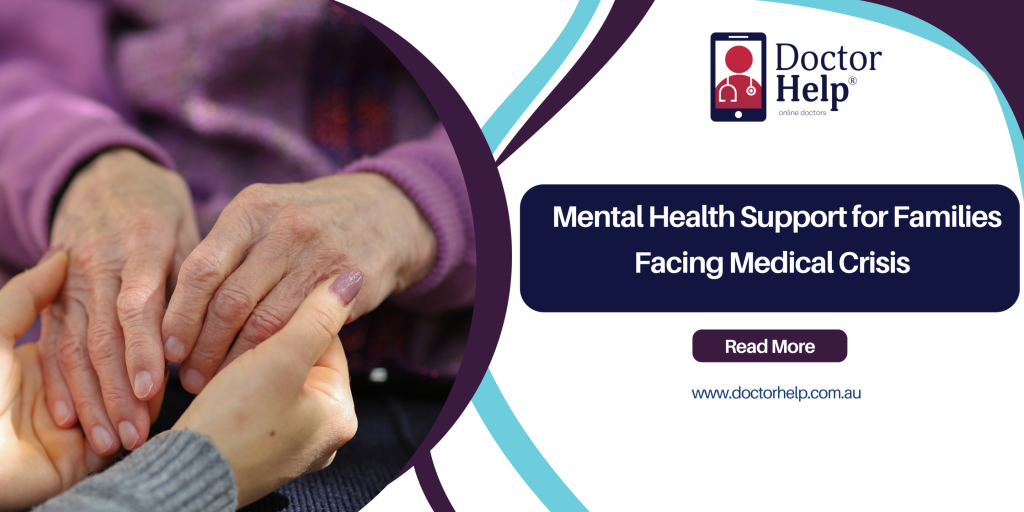Table of Contents
Caregiving comes with its fair share of overwhelming incidents when it comes to medical crises, taking a significant toll on mental health. Usually, the caregivers are family members and this is the reason why they need more mental health support.
In Australia, the burden on caregivers is hefty, with over 11% of the population providing care and love to family members who are chronically ill, or disabled. While this role represents the care and attention one wants to give to loved ones, if you don’t have a proper support system and do this alone, it can be the cause of stress, depression, and other mental health concerns.
This article discusses the difficulties of the caregiver with the real-life case study. It explains what are the options for the mental health support these family members can avail in serious situations.
Burden of Caregiving In Medical Crises
Many responsibilities come with a medical crisis, not everyone is equipped with coping technology and synchronization. There is a burden of managing appointments, administering medication, and handling the emotional well-being of their loved ones. Their tasks become more challenging amid the medical crisis especially when the patient’s condition is either chronic or serious. This mental stress can be exhausting, as caretakers often disregard their well-being while concentrating on the needs of the patient.
According to the stats by Carers Australia, caregivers are more likely to suffer psychological distress as compared to other individuals. Around 30% of Australian caregivers reported mental health issues. This emotional baggage of caregiving is compounded by isolation, lack of rest, and financial strain.
Taking a Famous Case of Ciara Burgin
This case was reported a few years ago where mother, Aishling Burgin’s determination to help her daughter, Ciara, walk unaided is a testament to unwavering parental love. Her major issue was to support her daughter and raise the funds, as the only caretaker, she gave her best. Aishling’s uncompromising dedication has not only altered Ciara’s mobility but also her happiness, as they embark on an extensive rehabilitation journey together, showcasing the incredible power of a mother’s love and determination.
Mental Health Impact: Stress, Anxiety, and Depression
Some of the most common issues of caregivers that require mental health support are stress, anxiety, and depression. Different pressures surround them, including the constant requirement of care, without any backup support, and this leads to chronic stress and and depression. This could be a truth never told but almost every single caregiver feels distress at some point of giving care to their loved ones. If neglected, caregivers may experience burnout, a state of emotional, mental, and physical exhaustion caused by prolonged and intense caregiving. This is the reason why taking a carer’s leave is also recommended in some of the cases.
Significance of Mental Health Support
Mental health support can be given to caregivers by developing robust support systems. The mental health of caregivers can be improved by building robust support systems. There are many support groups that help the carers as they are struggling with the condition of their family member.
However, most of the time the caregiving stress is overlooked and caregivers don’t seek help due to the feeling of guilt and urge to do it all by themselves. Addressing these concerns requires raising attention to the significance of self-care and mental health support.
Role of Telehealth in Stress Management
For the population in the city and urban areas, there are many support groups but not all the remote areas have support groups and they live in a close community where maintaining privacy is not viable. In this scenario, telehealth has emerged as a vital tool for providing mental health support for family members, who for any reason can’t travel all the way to clinics.
Telehealth providers the urgent access to online doctor advice conveniently even during the after-hours, eliminating the barriers of travel or waiting times. Families can engage in therapy sessions, support groups, and counselling from the comfort of their homes. This is specifically beneficial when juggling caregiving responsibilities and managing hospital visits.
Additionally, telehealth platforms often include features like online referral, enhancing communication between mental health specialists and families. This connectivity not only helps families manage their emotional burdens but also promotes a sense of community and support, reducing feelings of seclusion. The significance of telehealth in mental health support highlights its role in improving mental well-being during medical crises.
Conclusion
Caregiving is a challenging role, where there is an urge to see your loved one in a comfortable state, the pressure of giving it all might come with the consequences like neglecting one’s mental health. Many stress factors surround the caregivers like arranging funds, appointments, treatments and top of it the progress and the result. Hence mental health support an essential for families suffering medical crises of loved ones. As informal caregiving prevails, the support system for protecting the mental health of carers is also important.
There is a need to be aware and spread knowledge about the significance of mental peace, as it will benefit both the patients and their caregivers. This is where telehealth comes in, providing unlimited access to mental health support options from the comfort of your place, without leaving your loved ones, you can get access to the top medical practitioners, via Doctor Help online referral services. You can also apply for the carer’s leave online, click here to begin.
References
- Carers Australia, Mental Health & Wellbeing of Carers, https://www.carersaustralia.com.au.
- Australian Institute of Health and Welfare (AIHW), Informal Carers in Australia, https://www.aihw.gov.au.













